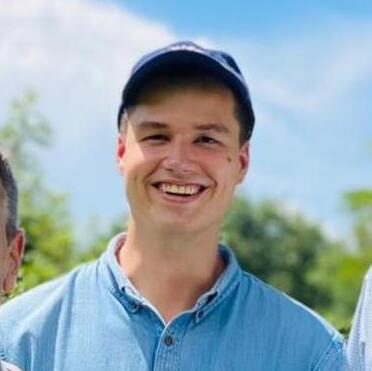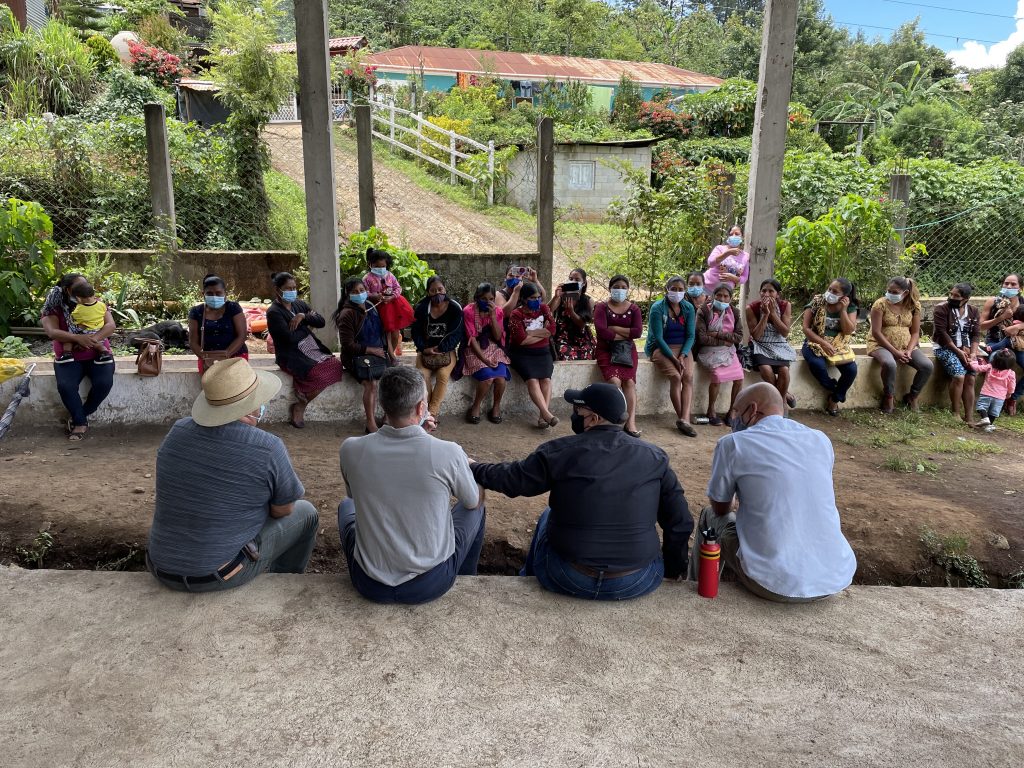Dispatches from Huehuetenango
Every year, extreme poverty drives thousands from Guatemala's western highlands to migrate north. The communities they leave behind tell their stories - and together, build reasons to stay.
By Michael Wyatt | October 4, 2021
EL PAJAL, Guatemala - "She left two weeks ago. She took her two children, one of the babies was very young." The group of women, a moment ago animated by our arrival, had fallen conspicuously quiet as Doña Flora spoke. "They made it to Mexico. It is hot, you must cross a desert before making it to the U.S., and she did not have the strength. They left her. They had to leave her. They took the kids and moved on. They had to leave her."
Our host, Felix, nods along solemnly while listening to Doña Flora speak. He is no stranger to hearing tragedies. There is a slight pause as Ken, a member of our group, and I translate what is being said to our two other companions.
The women gathered in front of us assume a look I have come to recognize. It is a look that you might mistake for passivity, or even apathy, if you are new to such a setting. Their faces drain of any reflexive emotion. The assumed facades become temporarily set, carefully maintained. The only features that betray their anguish are the eyes. It is a look of understanding. I think of Sisyphus; he must have shared the same understanding as he rolled his stone uphill for eternity - it is a knowing that there is only struggle ahead, struggle without apparent end. I have heard people talk about failed trips north before during my time living in Guatemala as a U.S. Peace Corps volunteer. I remember each story; guilt marks them in my memory. I wonder how many stories like this these women have lived through, using them to assemble their current masks piece by piece.

"The only future...is through the U.S."
We are in El Pajal, a modest aldea of San Antonio Huista, Huehuetenango. Mexico is about an hour north by car, assuming the roads are passable and the bridges are open. It is the rainy season or "winter," as Guatemaltecos call it, but the clouds of late afternoon have not yet rolled in to relieve us from the punishing June sun. The town is still. Most people have retreated into their homes from the worst heat of the day. A lingering haze has settled around the main street, a white chalk dust kicked up by the occasional pedestrian or pick-up truck passing by on the baked dirt road.
El Pajal is a microcosm of rural life in the western highlands of Guatemala. Indigenous and agrarian, the people here face a seemingly insurmountable wall of challenges. Changing climate patterns, discrimination, a history of violence, and a lack of access to basic necessities like water – these elements meld together to paint a too-common picture of the circumstances that lead this corner of the world to send more irregular migrants north than anywhere else. Felix put it bluntly, telling our companions that "for some Guatemalans, particularly the youth, the only future they see for themselves and their families is through the U.S."
If anything, he is tactfully understating the true scope of migration originating from the region. An estimated 1.5–3 million Guatemalans currently live and work in the United States. A significant majority of this number are from the western highlands, and Huehuetenango leads the country overall. The remittances they sent home last year totaled $12 billion, nearly 15% of Guatemala's GDP.
The telltale signs of these remittances dot the surrounding hillsides. Two-story houses, built with modern construction materials, are garishly painted with a color pallet that contrasts almost painfully with the milpa and mudbrick houses surrounding them. They represent the efforts of those who successfully made the arduous journey across Mexico, those who were able to work to pay back the coyotes who smuggled them into the U.S., and who eluded law enforcement long enough to send money back to their families. Some of these houses even represent families reunited after many years apart.
They also typify the best-case scenario, the narrow mark that many do not attain.

El Norte, un sueño
More than 70% of Huehuetecos, a population of over a million, live in poverty (<$2 USD per day). A similar percentage of children are malnourished or undernourished. Of those, 15% live in “extreme poverty," subsiding on less than 80 cents per day. The intense poverty is only compounded by annual weather patterns becoming more unpredictable and unforgiving- draughts, floods, earthquakes, hurricanes, and temperature swings, each making farming even more unpredictable. In 2020, back-to-back hurricanes wiped out entire villages. For many, the only option is to leave and look for work elsewhere, the U.S. being seen as having the most opportunity. They borrow money from friends and family, collect community donations, and even sell houses and family land. Some rely on highly unfavorable loans from the coyotes who operate a vast human migration network. They leave behind parents and siblings, spouses and children.
It is impossible to quantify the danger of migration from Central America and Mexico to the United States. An estimated 10,000 people have died at the U.S. border crossing alone in the last 25 years, more than one person every day. Studies of the entire route estimate that between 800-1,000 more die each year before seeing the Rio Grande. Women who make the journey suffer appallingly high rates of sexual assault and are increasingly vulnerable to abduction and human trafficking. Even those who make it across the border still must contend with the border patrol. So far, 2021 has seen the highest rates of migrant encounters ever posted by CBP and ICE, with some months recording a disconcerting 200,000 encounters. Between 50-75% of these encounters end with immediate expulsion: migrants are either sent back to their country of origin or left on the other side of the border. Those who make it are only at the beginning of the lonely, isolating, perilous experience of being an undocumented migrant in the U.S. They set off to work fourteen hours a day, six or seven days a week, performing back-breaking labor to send back what they can spare to their families. They dedicate themselves to the simple dream of providing a sliver of a future for their loved ones.
Despite the exceedingly high risk of undertaking the journey, conditions at home feel worse for many, and so, they choose to roll the dice of fate. It is not a decision any of them take lightly. The circumstances are quite literally life or death.
I will never forget one of the families I worked with in San Rafael Petzal, Huehuetenango. A mother and her three children, all of them severely malnourished, shared a single twin mattress in the crawlspace they rented under another family's floorboards. They had just enough money for a small pile of tortillas each day. The mother was only able to work a few hours a day due to her physical condition. The father had left to go north not long before I first met them; I am unsure if he made it. As I listen to Doña Flora's story in El Pajal, I am vividly confronted by the memory of a conversation I had with this mother, "I do not know how to tell my children. My beautiful boys. If I do not hear from my husband soon, they will have to leave school and work. They will need to work, or else we will starve." The boys were six and eight years old.
El Pajal is no exception to these realities; the push to migrate is felt equally here. It is noticeable the lack of men we have seen in the town today. While there is a growing trend of whole families migrating and mothers bringing children to reconnect with fathers in the U.S., the majority of immigrants from this part of the world are young men.

Doña Flora single-handedly owns and operates her coffee farm, which was originally purchased using remittances sent from the U.S. Thanks to her careful management, Doña Flora has since purchased additional land to expand the production of her farm..
Los que quedan
I understand the temptation to despair when looking at this Gordian knot of poverty and suffering. I feel overwhelmed by the immensity of the problem before us as a society and as a a fellow human. Yet, here in the outer reaches of Huehuetenango, the place most caught in the press, I find the deepest well of encouragement. Without exception, the resilience of Huehuetecos has defied my expectations. There is an apparently unending spring of energy to improve and persist. The women we meet with – wives, widows, single mothers, and heads of households - are striving to build something here for those who remain in El Pajal. We are meeting with the women's growing collective, an association of micro-scale coffee producers that formed just over a decade ago to enable the women to generate incomes themselves. Many of them have husbands and sons in the U.S.; all of them are responsible for others. In a country with deeply ingrained machismo and “traditional” gender roles, these women have eschewed the norms to become business owners and producers. After our initial meeting, we plan to visit Doña Flora's parcel, where she single-handedly tends to over an acre of coffee plants. She purchased the initial half-acre lot with money sent from the U.S. by her son, but the expansion she bought last year and the one she plans to purchase next year were earned through her efforts. Each producer that can move into earning their keep like Doña Flora represents a pinpoint of hope, a beachhead to long-term economic stability.
This group of women has also been one of the main driving forces behind the community's efforts to improve their access to water. Up until now, El Pajal had access to water once every fifteen days. The water would arrive at the community cistern for a few hours. Families would have to use this time to save up as much as possible, some filling pots and pans, and ration it for the next two weeks, though it still wasn’t potable. They are now on the cusp of completing a pump project which will bring water from a source miles away and thousands of meters down every four to five days. And the majority of households have purchased water filters that make the water drinkable without boiling it, thanks to partnerships with a few key outside organizations. While this still sounds insufficient to anyone with full-time running water, it represents an enormous leap in this community's immediate quality of life.

A resilience of spirit
In my opinion, though, the true quality of Guatemalans is found in a different kind of resilience. It is a resilience of spirit, an eternal kindness and generosity that will humble you to speechlessness. I have been fortunate enough to have lived and worked with Guatemalans for more than two years and have received more warm welcomes and gestures of friendship in that time than I can remember. For example, you will never walk into a Guatemalan's home and not be offered a refreshment. Each time I, an obviously well-fed and comically tall American, visited the family from San Rafael Petzal, I was offered sugar tea. No matter how much I protested, the mother struggling to feed her three children always ensured I left her house a little fuller than when I came in.

"As sure as those clouds bring rain, a full heart will bring change"
Our meeting is breaking up; I was more than a little lost in my thoughts for the last few moments. Felix has noticed my momentary obliviousness and has come over to check on me. I tell him about how overwhelming it is to hear about the ill-fated journey of a mother from the community. I tell him about the family from Petzal I had been thinking about during the meeting. I share with him how I feel guilty for looking on as an outsider. I also share how hopeful I am hearing from the women and how they remind me of similar groups and communities I have encountered across the western highlands. By all accounts a cheerful man, Felix is also deeply empathetic. "You know," he says, "these stories are people. They are the ones who will stay with you, in your heart. It is up to each of us to keep them with us." He points over the nearby ridge, at the massive wall of clouds approaching from the north. "As sure as those clouds will bring rain, a full heart will bring change."

Michael Wyatt is a Poverty Innovation Fellow with ThriveWorx. He served in the U.S. Peace Corps in Western Guatemala from 2019-2020, helping rural communities improve their livelihoods, health and sanitation. A graduate of the School of Public and International Affairs from the University of Georgia, Michael is currrently pursuing his MSc in International Politics at KU Leuven in Belgium.

